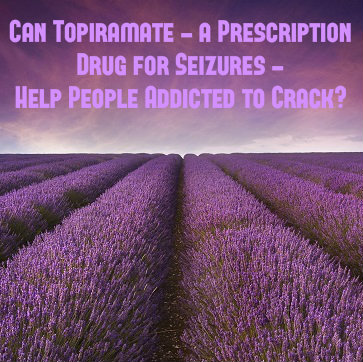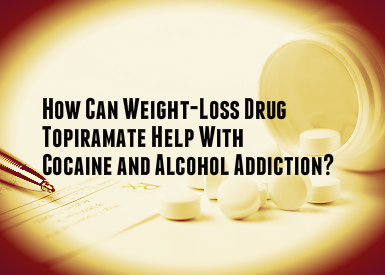Topiramate (Topamax) is a prescription medication originally developed as a treatment for certain seizure disorders. Doctors also sometimes prescribe this medication to people affected by other serious health issues, including alcohol addiction. In a study published in May 2014 in the journal Drug and Alcohol Dependence, researchers from two Dutch institutions explored the potential usefulness of topiramate as a treatment for people addicted to crack cocaine. These researchers found that only a small subset of individuals addicted to this form of cocaine clearly benefit from topiramate use.
How Does Topiramate Work?
Specific seizure disorders treated with topiramate include Lennox-Gastaut syndrome and certain forms of epilepsy. The medication helps people affected by these conditions by easing excessive nerve activity inside the brain. This same effect on brain function can also help stop migraine headaches from occurring.
When given to people affected by alcoholism, topiramate can diminish the severity of some of the symptoms associated with alcohol withdrawal, and can thereby help reduce the likelihood that a recovering alcoholic will lapse back into active drinking. Doctors may also prescribe the medication to people affected by medically serious forms of obesity. Available forms of topiramate include tablets and specially designed granules that users can release from a capsule and mix with food.
Topiramate And Cocaine Addiction
 There is no medication in doctors’ treatment arsenals approved to help people affected by cocaine addiction. Instead, successful treatment typically depends on a form of behavior modification therapy called cognitive behavioral therapy or on other non-medication-based therapeutic options. Addiction researchers are actively looking for new medications that could help people addicted to cocaine, as well as existing medications that could be adapted for use in cocaine addiction treatment.
There is no medication in doctors’ treatment arsenals approved to help people affected by cocaine addiction. Instead, successful treatment typically depends on a form of behavior modification therapy called cognitive behavioral therapy or on other non-medication-based therapeutic options. Addiction researchers are actively looking for new medications that could help people addicted to cocaine, as well as existing medications that could be adapted for use in cocaine addiction treatment.
In a study published in October 2013 in the American Medical Association journal JAMA Psychiatry, a multi-university research team studied the effects of topiramate on 71 adults impacted by cocaine addiction. These researchers concluded that, compared to recovering addicts who don’t receive the medication while undergoing cognitive behavioral therapy, those who receive both topiramate and cognitive behavioral therapy experience improvements that include longer periods of cocaine abstinence (verified by an increased number of cocaine-free urine drug tests) and a reduced craving for further cocaine intake.
Potential Usefulness Of Topiramate In Crack Cocaine Treatment
Crack cocaine is powdered cocaine that has undergone an additional step of chemical processing. While the two forms of the drug have the same basic brain effects, crack only produces these effects for a relatively brief amount of time. This means that users of this form of cocaine may take the drug more frequently, and therefore may have greater odds of eventually experiencing the long-term brain changes associated with cocaine addiction.
In the study published in Drug and Alcohol Dependence, researchers from Parnassia Addiction Research Centre and the University of Amsterdam specifically investigated the potential usefulness of topiramate treatment in people addicted to crack cocaine. Thirty-seven participants in the study received a 12-week combination of topiramate and cognitive behavioral therapy, while another thirty-seven participants only received cognitive behavioral therapy.
The researchers mainly measured the effectiveness of topiramate treatment by comparing the rate of continued program involvement among recipients of the medication to the rate of continued involvement among those who did not receive the medication.
Variance Factors In Topiramate Use
In addition, they assessed such things as the regularity with which participants took their prescribed topiramate, the presence of negative side effects in the topiramate users, the ability to avoid using cocaine or other substances, the ability of medication users to interact in socially appropriate ways and the level of satisfaction that the topiramate recipients expressed toward use of the medication.
After completing their assessments, the researchers found that topiramate didn’t produce any serious side effects in the study participants. However, they also found that most of the medication recipients did not take it on a regular basis. In addition, they concluded that use of topiramate neither increased the length of involvement in cocaine addiction treatment nor generally contributed to a reduction in the consumption of cocaine or any other substance.
Critically, one group affected by crack cocaine addiction did benefit from topiramate use: those individuals simultaneously impacted by an addiction to opioid drugs or medications. This subset of addicts significantly lowered their cocaine intake while taking topiramate.
Importance Of Consistency Of Topiramate Use
The authors of the study published in Drug and Alcohol Dependence link the low level of topiramate effectiveness in crack cocaine addicts to highly inconsistent intake of the medication. Because many people in treatment don’t maintain their medication routines, the authors believe that topiramate may only play a relatively minor role in addressing the effects of crack cocaine addiction.
If you or a loved one is struggling with cocaine or any other addiction, call us now! We are here to help you!
Read More About The Addiction Treatment Uses For Topiramate
A recent study published in the journal Drug and Alcohol Dependence reports that the drug topiramate may help people battling cocaine addiction. More specifically, the study showed that people suffering from both cocaine and alcohol dependence may be more successful in treatment and use less cocaine if they are prescribed topiramate. These findings largely agree with previous, separate studies that also show topiramate’s potential usefulness for treating cocaine and alcohol addictions. However, this most recent study is the first to look at the drug’s effectiveness for people dealing with both dependencies at the same time.
What Is Topiramate?
Topiramate is an anticonvulsant drug that was discovered in 1979. It was approved by the Food and Drug Administration (FDA) in 1996 and has been primarily used to manage seizures in patients with epilepsy. Topiramate has also been frequently prescribed to prevent migraine headaches. In 2012, the FDA also approved topiramate for use as a weight-loss drug in combination with the drug phentermine.
 One of the effects of topiramate is an increase in the amount of gamma-Aminobutyric Acid, or GABA, in the brain. This substance is a neuro-inhibitor, and researchers now hope that using topiramate to increase GABA levels may help limit the dopamine release that happens when people take cocaine or drink alcohol. This would reduce the euphoric feelings that result from these substances, and make it easier for people to resist cravings and fight addiction.
One of the effects of topiramate is an increase in the amount of gamma-Aminobutyric Acid, or GABA, in the brain. This substance is a neuro-inhibitor, and researchers now hope that using topiramate to increase GABA levels may help limit the dopamine release that happens when people take cocaine or drink alcohol. This would reduce the euphoric feelings that result from these substances, and make it easier for people to resist cravings and fight addiction.
Details Of The New Study
Researchers in the psychiatry department of the Perelman School of Medicine at the University of Pennsylvania created and published the new topiramate study. These researchers were assisted by the Charles O’Brien Center for Addiction Treatment.
The study took place over 13 weeks, with the participation of 170 people who experienced both cocaine and alcohol dependence. The majority of the participants in the study were African-American males, and participants had an average age of 45.
Some of the patients were treated with topiramate, while others were given a placebo. The study employed a double-blind set-up, in which neither the patients nor the researchers knew who was taking the drug versus the placebo. This allowed researchers to examine the true effectiveness of the drug at reducing cravings, reducing overall consumption of cocaine and alcohol, and helping patients stay in treatment.
Mixed Results
At the conclusion of the study, researchers found both positive and neutral results for the effectiveness of topiramate. Patients who received the drug were more likely to remain in treatment and less likely to use cocaine during the last three weeks of the trial than those who received the placebo. Twenty percent of the participants on topiramate were able go without cocaine during the study, compared to only 7 percent of the participants on the placebo. Patients who had the worst withdrawal symptoms in the past seemed to benefit the most from topiramate.
However, the drug was not better than the placebo at reducing cocaine cravings. In addition, the drug did not help patients reduce their drinking even though they generally reported reduced alcohol cravings.
These results were somewhat surprising, since past studies have shown that topiramate did help people with alcohol dependence. The researchers in the Perelman School of Medicine have speculated that these poor results may reflect the low number of heavy drinkers who participated in the study. In past studies, the average number of days of heavy drinking among the study participants was much higher. It may be that topiramate is more effective for people who are very heavy drinkers.
What Is Next For Topiramate?
Although topiramate studies have been promising, additional research is needed to determine whether the drug can be a useful long-term tool for fighting cocaine and alcohol dependence. Researchers plan to perform more studies in order find out whether topiramate is effective when paired with additional drugs. By combining different drugs that have shown moderate success, researchers hope to produce even more impressive results for a greater percentage of patients.
Ultimately, larger scale studies will be necessary before the FDA can approve topiramate for additional treatment purposes.
Click Here – To Read More About Other Surprising Medications That Help Cocaine Addiction.
29 Aug 2013
Drug May Help Teens Overcome Cocaine Addiction
Teens being treated for substance addiction may soon have a new tool to combat their drug problem. A new study finds that outcomes are improved for cocaine addiction treatment when the drug Topamax is included as part of the strategy for recovery.
Treating cocaine addiction can be challenging. Teens that begin using cocaine can become addicted quickly, and when treatment is sought and completed, relapse can be common. Teens often enter into a cycle of recovery and relapse with cocaine addiction.
Addiction to Alcohol
It is common for teens addicted to cocaine to also be addicted to alcohol. Abuse and addiction of both substances can make treatment complicated. For some, the traditional route of cognitive behavioral therapy is not an effective strategy for recovery to be a permanent state.
Topamax, a drug often prescribed for the purposes of treating epilepsy and, in more recent cases, weight loss, has been shown to help those attempting recovery from cocaine and alcohol addiction.
The Study
The research team from the University of Pennsylvania School of Medicine used a double-blind, placebo-controlled design to test the effectiveness of topiramate in treating addiction, particularly in cases where cocaine addiction is complicated with a dependence on alcohol.
Previous studies have proven the effectiveness of topiramate in treating alcohol addiction. Other studies have shown that it can help prevent relapse in those who have received treatment for cocaine addiction. However, this is the first study to explore its application in treatment for a combined addiction to cocaine and alcohol.
The study’s results are critical because those who struggle with cocaine addiction commonly also struggle with alcohol dependence. Targeting the addictions as a unit may be an effective strategy to make recovery more successful.
The study was conducted over a 13-week period that included 170 individuals who met criteria for alcohol and cocaine addiction. The trial produced mixed results.
The Results
The researchers discovered that the drug was effective at reducing the cravings for alcohol, but actual drinking did not decrease. It was not found to impact cocaine cravings.
However, the study participants that were taking topiramate were more likely to remain in treatment and avoid cocaine use during the last three weeks of the trial when compared to participants who were taking a placebo.
The researchers also found that participants taking topiramate were more likely to benefit from the drug if they reported more severe withdrawal symptoms. Those who indicated a high level of restless behavior, agitation and depressed mood were more likely to report benefiting from topiramate.
Counseling and the Drug
First author of the paper, Kyle M. Kampman, M.D., professor of psychiatry and medical director at the Charles O’Brien Center for Addiction Treatment, explains that while counseling is the first choice for addiction, there are some patients who are not responsive to this strategy.
The results of the study indicate that for those who have a particularly treatment-resistant addiction, the addition of a topiramate treatment in addition to cognitive behavioral therapy may result in better outcomes.
The study’s findings add to a growing body of research that supports the use of topiramate to aid in treating addiction. A previous study conducted in 2005 provided evidence that addicts treated with the drug were able to abstain from cocaine use for three weeks or longer.
The researchers note that the failure of topiramate to reduce alcohol use was puzzling, but may be explained by the severity level of that particular group of participants. The effects may be more visible when an individual has a habit of drinking heavily.
The Test Subjects
The study’s findings were the result of a trial conducted among a group of addicts who had an average age of 45 years and which was largely composed of African-American males. The groups of men examined using the drug of treatment and a placebo were similar in terms of sociodemographic variables or drug and alcohol use.
The findings of the study were published in a recent issue of the journal Drug and Alcohol Dependence.
25 Mar 2013
Topiramate Treatment for Alcoholism
Topiramate is an anticonvulsant medication used to treat seizures stemming from the presence of epilepsy or a separate seizure disorder called Lennox-Gaustaut syndrome; in addition, doctors frequently prescribe the medication in order to prevent the return of symptoms in people with a history of migraine headaches. According to a variety of scientific studies conducted in the 2000s, topiramate can also help doctors treat people with alcoholism by decreasing alcohol cravings and promoting a decrease in alcohol intake. Unlike other medications used to treat alcoholism, topiramate can be successfully prescribed to people still actively consuming large amounts of alcohol.
Read More
Posttraumatic stress syndrome and substance abuse disorders are among the hardest mental disorders to treat. People with posttraumatic stress disorders often spend years in psychotherapy without making significant progress in alleviating their symptoms, which can be debilitating enough to affect their everyday lives. Those with substance abuse disorders can go through expensive residential addiction treatments, and then relapse into their old lifestyles.



